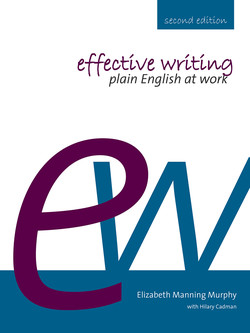Читать книгу Effective Writing - Elizabeth Manning Murphy - Страница 34
На сайте Литреса книга снята с продажи.
4.1 Noun
ОглавлениеNouns name things. There are several types of noun – common, proper, collective and abstract.
Common nouns name everyday things that you can touch:
The children used the table as a cubbyhouse and held a party with their toys.
Proper nouns name particular things and always begin with a capital letter:
Joe visited Canberra on Sunday and stayed at the Royal Hotel.
Collective nouns name groups of things:
The huge audience was cheering as the winning basketball team collected their medals.
Note that singular collective nouns can have singular or plural connotations, depending on whether they are regarded as single units or separate individuals in a given context – for example:
The jury was considering its verdict – singular, because the jury here is acting as one unit
The jury dispersed to their respective homes after the trial – plural, because here the jury means ‘the individual members of the jury’.
Abstract nouns name things that you cannot touch, like feelings and emotions:
‘Happiness is the freedom to do what you want’ he said.
Nouns also have number, gender and case.
Number indicates whether there is one or more of the given noun. Plural number is marked by one of the regular or irregular plural markers – see Sections 3.7 and 3.8.
Gender is sometimes marked by a special ending – for example -or/-ess, as in actor (masculine) and actress (feminine). However, gender marking is disappearing from writing and everyday language, so that it is becoming usual to use actor for both male and female stage performers. Most nouns are neuter.
Case of English nouns is only clear from the position and function of the noun in the sentence:
The assistant (subjective case) made six copies of the report.
The manager praised the assistant (objective case) on the quality of the reports.
The assistant’s (possessive case) work was excellent.
Activity 4a
Identify the nouns in these sentences and say as much as you can about their type, number, gender and case:
1 The congregation in the church on Sunday prayed for peace.
2 One boy in the choir gave the other boys a fright by dropping all the books.
3 The news was given to Peter’s parents by the constable.
Solutions 4a
1 congregation (collective, singular, neuter, subjective); church (common, sg, n, obj); Sunday (proper, sg, n, obj); peace (abstract, sg, n, obj)
2 boy (common, sg, masculine, subj); choir (collective, sg, n, obj) ; boys (common, plural, masc, indirect obj); fright (abstract, sg, n, obj); books (common, pl, n, obj)
3 news (common, sg, n, subj); Peter’s (proper, sg, masc, possessive); parents (common, pl, common, obj); constable (common, sg, common, obj)
